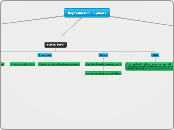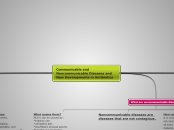Prokaryotes (Jeanette Castano)
Ecological Interctions
Parasitism
endotoxins
Released only when bacteria die.
exotoxins-
secreted and cause disease.
Commensalism
one benefit, the other is neither harm or helped
Mutualism
Both organism benefit
Symbiosis
Two species ive in close contact: larger-smaller
Biofilm
Teeth plaque
Archea
Euyarchaeota
Korarchaeota
Crenarchaeota
Aigarchaeota
Thamarchaeota
Bacteria
Gram positive Bacteria
Mycoplasms- smallestknow cells
staphylococcus
clostridium botulinum- cause of botulism
Bcillus anthracis- cause of anthrax
Actinomycetes- decomp soil
Involve in the process of endosymbiosis
Photoautotrophs
Spirochetes
Treponema, pallidum (syphilis) and borrelia.
Helical heterotrphs
Chlamydias
Causes blindness
Live in animal cells
Proteobacteria (Gram-Negative)
Epsilon
Helicobacter Pylori- stomach ulcers
Campylobacter- blood poisoning
Delta
Myxobacteria- produces drought resistant "myxospores"
Gamma
Escherichia coli resides in the intestines
Legionella
Salmonella
Thiomargarita namibiensis
Beta
Soil bacterium Nitrosomas
Alpha
Used in genetic engineering.
Agrobacterium- tumors in plants
Shape
Spirilium (spiral)
Bacillus (Rod-shape)
Coccus (Spherical)
Uses of prokaryotes
Bio engineering
Vitamins, antibiotics and hormones
Biomediation
Use of organisms to remove pollutants from environment. (oil spills)
Make Plastic
Bacteria synthesizing and storing PHA
Transgenic Plants
Agrobacterium
Cloning
E.coli
Lifestyle
Extremophile
Psychrophiles
Alkalinophiles
Acidophiles
Thermophiles
Halophiles
Nutritional categories
Metabolism
Decomposers
Breaking down dead organism
Methanogens
Nitrogen fixers
Nitrogen bond turned into AA
Facultative Anarobes
can survive with or without O2
Obligate anaerobes
Fermentation
Obligated aerobes
cellular respiration
Energy and Carbon Source
Photoheterotroph
Rhodobacter
Chemoheterotroph-
animals
Chemoautotroph
Sulfolobus
Photoautotroph
Cyanobacteria
Reproduction
Sexual
Horizontal gene transfer
Transduction
Infect bacteria
Conjugation
DNA and pilus.
Transformation
cell incorporate foreign DNA
Asexual
Binary Fission









